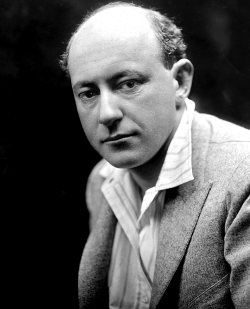Cecil B DeMille

Cecil B DeMille was a founder of the Hollywood motion-picture industry, one of the most commercially successful producer-directors of his time, and one of the most influential filmmakers in history.
He was born on August 12, 1881 in Ashfield, Massachusetts during a family vacation, but spent most of his childhood in both North Carolina and New Jersey, with his parents and siblings.
Cecil's father, Henry, had been a lay reader at the Episcopal church in his younger years, and when he met and married Cecil's mother, Beatrice, she converted to his faith.
His father read to him nightly, both from the classics and from the Bible, and it's clear that religion was an important part of Cecil's upbringing, continuing through his life and showing itself through his work. He once stated that his films were a continuation of his father's labor.
"My ministry has been to make religious movies and to get more people to read the Bible than anyone else ever has."
In 1900, Cecil began his career on the Broadway stage, where he performed with many actors with whom he would later direct in his movies. This career move came in late 1913, when he and a cast and crew headed across the country to shoot a feature film.
For the movie, he had wanted to emphasize the outdoors, and shoot the movie in a place that had exotic scenery and stunning landscape. After some to-ing and fro-ing, he finally settled on Hollywood as the right location. As it turned out, his directorial debut, was also the first feature film to be shot in Hollywood, and the interracial love story called The Squaw Man, was a phenomenal hit - putting Hollywood on the map.
The Squaw Man went on to become the only movie successfully filmed three times by the same director/producer, when he filmed a silent remake in 1918, and a talkie version in 1931.
Between 1913 and 1956, Cecil B DeMille made a total of seventy feature films, both silent and sound. He is acknowledged as a founding father of the cinema of the United States, and the most commercially successful producer-director in film history.
By 1921, he was the most successful producer/director in America. His first biblical silent film epic in 1923, The Ten Commandments, was both a critical and financial success, and the talkie remake from 1956 is still broadcast every Easter Sunday on the ABC Television Network.
But the man known as a filmmaker has a legacy which also includes great work in front of the microphone. There can be no dispute over the fact that Cecil B DeMille was also a huge figure in old time radio.
As Hollywood's leading film director, he joined the crème de la crème of Hollywood's silver screen stars as the Lux Radio Theater's master of ceremonies on 1st June, 1936, with the first show featuring Marlene Dietrich and Clark Gable in The Legionnaire and the Lady.
Having him on the books came with some perks too, as on 2nd November 1936, Lux presented the first of Cecil B DeMille's own movies on radio, called The Virginian, starring Gary Cooper. Next came The Plainsman on 31st May 1937, where the original movie actor, again Gary Cooper, was intended to star in the radio broadcast, but at the last minute had to be replaced due to illness.
The Buccaneer starring Clark Cable followed on 14th November 1938, and then Northwest Mounted Police on April 13th 1942, and The Story of Doctor Wassell, on 23rd October 1944 - again both starring the original movie actor, Gary Cooper.
As the host of Lux Radio Theater, Cecil B DeMille's voice came to be one of the most recognizable in America, and he was once quoted as saying that he wouldn't give up the job for a million dollars. However, after hosting the radio series for nine years, on January 22nd, 1945, he was forced to resign from his role after a clash with the American Federation of Radio Artists.
At the time, there was a political campaign supporting the closed shop union rulings, which required its members to contribute a dollar towards the campaign. Although he was in favor of unions, he condemned the political fee and refused to pay. He was suspended from the union in January, which banished him from radio (and later also television) for the rest of his life.
It made no odds to his success as a director however. He was first, last and all time the showman, and continued to make blockbuster films right up until, at the age of 77, and after 58 years in show business, he passed away on 21st January 1959.
It's over fifty years since he passed away, but it never fails to remind me how lucky we are to still hear his distinctive voice across nearly ten years of Lux Radio Theater shows on RUSC.
Happy listening my friends,
